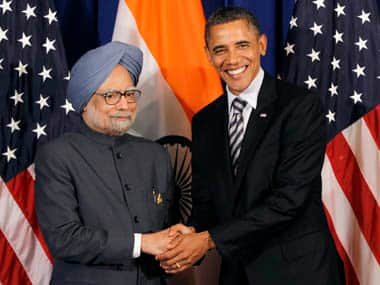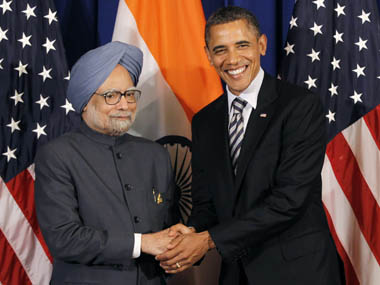New York: Prime Minister Manmohan Singh’s visit to the US starting on Thursday is aimed at deepening cooperation in defense, security, economic issues and discussing changes in the US visa system. There are also signs of some movement on a deal between Westinghouse and the Nuclear Power Corporation of India — which would represent symbolic progress in the nuclear energy realm. The two leaders who share an easy chemistry are also expected to discuss the US drawdown from Afghanistan slated for 2014 and the Syria crisis when Singh meets Obama in the White House for a working lunch on Friday. Both sides are playing down the possibility of potential agreements, but there has been an effort to get deals done on the defense and climate change fronts. Last week, US Deputy Defense Secretary Ashton Carter proposed ways to deepen defense ties between the US and India, including co-development of the next version of the Javelin anti-tank missile now built by Raytheon and Lockheed Martin. [caption id=“attachment_1134403” align=“alignleft” width=“380”]
 Both sides are playing down the possibility of potential agreements, but there has been an effort to get deals done on the defense and climate change fronts. Reuters[/caption] Also on the energy front, the two countries continue to cooperate on clean energy technology, as well as potential American exports of liquefied natural gas to India. For several years, Westinghouse has been in talks with state-run NPCIL that would pave the way for construction of an AP-1000 nuclear power plant in Gujarat. Westinghouse even signed a memorandum of understanding with NPCIL in June last year to work towards a contract for preliminary licensing and site development in Gujarat. A big idea unfulfilled can lead to disillusionment as with the two countries’ civil nuclear deal, so both governments naturally want to create an impression of progress. “I think they’re hoping to do a pre-early works (agreement), which involves some transfer of proprietary information,” National Security Adviser Shivshankar Menon told Reuters. The value of the preliminary contract has not been revealed. Indian officials say the proposed deal between Westinghouse and NPCIL would be the first time money is committed to a commercial US nuclear supplier. Things have been so moribund on the nuclear energy front that the small deal would represent substantive progress. “Why are we putting so much stock in this pre-early works agreement? Because there lies ahead a much steeper climb toward solving problems created by the Indian liability law,” an industry source told Firstpost. When Singh and former US president George W Bush signed the civil nuclear deal in 2008, it was heralded as a new era in post-Cold war ties and US companies hoped to reap a bonanza in reactor sales. But on the nuclear front, progress has been slow and disappointing. In 2010, India’s parliament passed a nuclear liability act that departed from international practices in making companies liable to pay compensation without monetary limit in the event of a nuclear accident. The preliminary deal with Westinghouse would not involve putting in place nuclear equipment, so would not brush up against the liability issue, Indian officials said. A preliminary contract between Westinghouse and NPCIL would be limited in scope to site assessments. But international suppliers have been wary of the unusual degree of liability created by Indian law — even in the context of preliminary contracts. But the Indian government has said the law won’t be changed. But the reluctance of foreign suppliers to accept the added costs associated with increased liability exposure suggests that if the liability law does not change, something must. Last month, “The Telegraph” reported that India accepted a demand from Russia to revise upward the price of the next pair of Russian VVER reactors at Kudankulam in consideration of added costs created by the Indian nuclear liability law. An industry source states that France aims to use the same approach in negotiations for the sale of its first pair of EPR reactors at Jaitapur. Over the last decade, business was among the strongest proponents of the US-India relationship, but more recently it has been the complaints from this sector that have been louder. As the fate of the H-1B visa program rests with the US Congress, Indian tech firms are losing sleep over proposed changes to the H-1B visa portion of the US immigration bill. The US-India Business Council (UIBC) and Nasscom, which represents India’s technology sector, which clocks in $100 billion in annual revenue, are asking House lawmakers to kill restrictive provisions for H-1B and L-1 visas. Sections of American business and labour have expressed chagrin about Indian trade and investment policies. Bilateral trade is pegged at $100 billion. Singh is also due to address the UN General Assembly in New York on Saturday. On the sidelines he is expected to meet his Pakistani counterpart Nawaz Sharif.
Both sides are playing down the possibility of potential agreements, but there has been an effort to get deals done on the defense and climate change fronts. Reuters[/caption] Also on the energy front, the two countries continue to cooperate on clean energy technology, as well as potential American exports of liquefied natural gas to India. For several years, Westinghouse has been in talks with state-run NPCIL that would pave the way for construction of an AP-1000 nuclear power plant in Gujarat. Westinghouse even signed a memorandum of understanding with NPCIL in June last year to work towards a contract for preliminary licensing and site development in Gujarat. A big idea unfulfilled can lead to disillusionment as with the two countries’ civil nuclear deal, so both governments naturally want to create an impression of progress. “I think they’re hoping to do a pre-early works (agreement), which involves some transfer of proprietary information,” National Security Adviser Shivshankar Menon told Reuters. The value of the preliminary contract has not been revealed. Indian officials say the proposed deal between Westinghouse and NPCIL would be the first time money is committed to a commercial US nuclear supplier. Things have been so moribund on the nuclear energy front that the small deal would represent substantive progress. “Why are we putting so much stock in this pre-early works agreement? Because there lies ahead a much steeper climb toward solving problems created by the Indian liability law,” an industry source told Firstpost. When Singh and former US president George W Bush signed the civil nuclear deal in 2008, it was heralded as a new era in post-Cold war ties and US companies hoped to reap a bonanza in reactor sales. But on the nuclear front, progress has been slow and disappointing. In 2010, India’s parliament passed a nuclear liability act that departed from international practices in making companies liable to pay compensation without monetary limit in the event of a nuclear accident. The preliminary deal with Westinghouse would not involve putting in place nuclear equipment, so would not brush up against the liability issue, Indian officials said. A preliminary contract between Westinghouse and NPCIL would be limited in scope to site assessments. But international suppliers have been wary of the unusual degree of liability created by Indian law — even in the context of preliminary contracts. But the Indian government has said the law won’t be changed. But the reluctance of foreign suppliers to accept the added costs associated with increased liability exposure suggests that if the liability law does not change, something must. Last month, “The Telegraph” reported that India accepted a demand from Russia to revise upward the price of the next pair of Russian VVER reactors at Kudankulam in consideration of added costs created by the Indian nuclear liability law. An industry source states that France aims to use the same approach in negotiations for the sale of its first pair of EPR reactors at Jaitapur. Over the last decade, business was among the strongest proponents of the US-India relationship, but more recently it has been the complaints from this sector that have been louder. As the fate of the H-1B visa program rests with the US Congress, Indian tech firms are losing sleep over proposed changes to the H-1B visa portion of the US immigration bill. The US-India Business Council (UIBC) and Nasscom, which represents India’s technology sector, which clocks in $100 billion in annual revenue, are asking House lawmakers to kill restrictive provisions for H-1B and L-1 visas. Sections of American business and labour have expressed chagrin about Indian trade and investment policies. Bilateral trade is pegged at $100 billion. Singh is also due to address the UN General Assembly in New York on Saturday. On the sidelines he is expected to meet his Pakistani counterpart Nawaz Sharif.
Manmohan Singh’s visit to US to focus on nuclear deal, trade ties
Uttara Choudhury
• September 26, 2013, 09:17:27 IST
Prime Minister Manmohan Singh’s visit to the US starting on Thursday is aimed at deepening cooperation in defense, security, economic issues and discussing changes in the US visa system.
Advertisement
)
End of Article